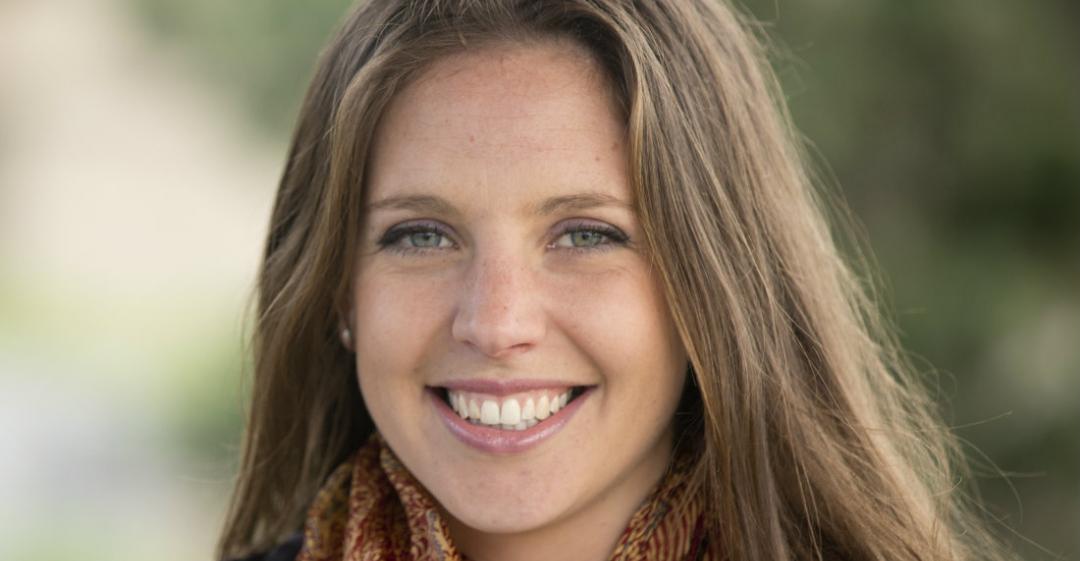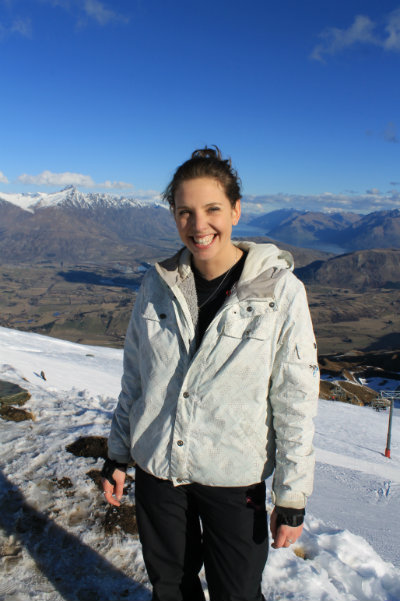“For one of the first times in my life, I made a major, life-changing decision by gut instinct.”

What work were you doing previously?
I was a corporate solicitor.
My team did general corporate work including mergers and acquisitions, corporate governance and contract review. We had a range of both private and government clients. The role also gave me the opportunity to go on a six-month secondment to one of the magic circle firms in London.
What are you doing now?
I work at a charitable organisation, Inspiring Stories Trust.
I'm Programme Manager for its Future Leaders programme, which backs emerging leaders aged 18–25 in rural and provincial New Zealand to build their social entrepreneurship and leadership capability, apply their learning, and develop initiatives to make a difference in their backyard. It's pretty inspiring stuff.
I'm also Programme Manager of Live the Dream, a nine-week social entrepreneurship accelerator programme.
I design the curriculum, do a lot of facilitation, build relationships with our funding partners (local councils and mayors, in particular), and manage the budget.
Why did you change?
At both of the law firms I worked at, I was putting in long hours, was privy to some very stressful projects, and never quite shook the feeling that I shouldn't be there.
I had never originally planned to be a lawyer; I'd intended to continue my studies with a Masters in Town Planning. But when my sister encouraged me to follow in her footsteps and pursue the corporate law path – and when I did well at it – a ball seemed to be set in motion and I kept going.
I had a feeling I wasn't headed in the right direction; I just wasn't quite ready to change course. I was determined to put in at least two years at my firm before fronting up to a big shift. Once that time was up, I was ready to take another look.
And when I did, I was somewhat alarmed by how off-kilter it all felt.
When was the moment you decided to make the change?
Looking back, I suspect the London secondment could have been the straw that broke the camel's back.
It's very common for Kiwis to rack up their two to three years in New Zealand then head to London or a similarly international city to practise over there. It boosts the CV, the bank account and one's options for exciting holiday destinations.
I only had a six-month placement, but at the end of my time there I knew I wouldn't be coming back for round two.
I remember sitting on a beach in Morocco and feeling my shoulders un-hunch and my back loosen. I realised how tense I'd been for the past six months, sitting on high alert in my supervisor's office in London. I knew then that it just wasn't worth it. So, I went back home and spent a further eight months working for my law firm in Auckland before signing out of corporate law altogether.
Are you happy with the change?
I have no regrets, both in terms of the change, and in pursuing law in the first place.
Both close friends and family have commented on how much more relaxed I am now. Rather than being 'Corporate Anna' at work and an entirely different human at home, I feel like I can be more true to myself in the workplace.
Having time autonomy is incredibly important to me, as is scope of creativity and meaningful contact with people. I know I'll look for these elements in any job I take from now on.
Looking back, I do value the training, experience and networks I made before the change. But if I had to go back to that moment of deciding to change, I would do so again – every time.
What do you miss and what don't you miss?
I miss having a wider cohort of peers.
The social side of being in the law develops as you progress through the firm. Being part of a much smaller organisation means a smaller support network among colleagues. Having said that, my team at Inspiring Stories is awesome; it's all about quality over quantity!
I also miss the training opportunities. Apart from many legal training workshops, law firms are really good at investing in their juniors. Personal development sessions on worker types, being a successful woman in the workplace, leadership skills – these were all an important part of my training. Smaller organisations, like the one I'm in now, don't necessarily have the same budget.
I do not miss reading and re-reading reports for stray commas, the corporate hierarchy, or the stress of doing work which doesn't sit well with my values. And I don't miss cancelling plans with friends for the fourth time in a row.
Nor do I miss the lack of autonomy in my job; in fact, I relish sending an email without anyone looking it over and completely redrafting it.
How did you go about making the shift?
I read books like The Escape Manifesto, from Escape the City, and Leaving Law by Adele Barlow and Ivan Cruz.
I also spent a lot of time on websites like Careershifters. I was seeking advice and inspiration on how to make my change. In every story I read, I was looking for a glimpse of insight into how my story would turn out.
I very deliberately did not resign until I had another job lined up. I spent my free evenings and weekends searching and applying for new jobs. I didn't know what it was that I wanted to do next. I just knew it was going to be 'something completely different'. Among the array of jobs for which I'd applied was one as a hiking guide in the mountains of Fiordland. I wanted this role more than any of the policy jobs or post-grad opportunities further down my list, and I got it.
During this time I'd also been working with a mentor to identify my values, my worker / personality type and the sectors I might best be suited to. I'd been endeavouring to match jobs I applied for with my top five values.
However, at the end of the day, I went with my gut. I didn't go through a huge process of analysing my decision to change from lawyer to hiking guide. I was simply too excited at the prospect of showing off New Zealand's finest to a willing audience. So, for perhaps one of the first times in my life, I made a major, life-changing decision by gut instinct. And, with the benefit of hindsight, I really do recommend it.
In fact, I employed this technique again when the hiking season came to a close. Although I'd dabbled in the prospect of being a lawyer again, I knew it didn't feel right. And unlike at university, where I'd barrelled along regardless, I decided to take stock of my career compass, and change direction. It felt scary and uncomfortable – and there were no guarantees that what I was listening to was indeed my gut – but I did it anyway.
What didn't go well? What 'wrong turns' did you take?
While guiding, I continued to seek out my 'something else', but I was applying for what seemed like a million jobs, without much rhyme or reason.
I think I was still in panic mode about not having something lined up to go into immediately. Looking back, I should have taken a firmer stand for just 'going with the flow'. The worst thing would have been to accept a job in much the same way as I had while at university.
How did you handle your finances to make your change possible?
I started saving money when I was working in London and continued to do so on my return to New Zealand.
I went straight into paid employment one week after finishing up at my law firm, so finances were never an issue.
What was the most difficult thing about changing?
For me, the most difficult thing about changing was going from wanting to make the change to actually making it.
When you're still standing on the safe side of change, the gap between you and the other side is immense. It's intimidating and overwhelming.
What help did you get? 
I relied on career change websites like Careershifters and on my mentor for guidance.
In addition, I spent hours talking to my close friends – many of whom were in similar situations.
But, at the end of the day, it was me who had to decide if and how I was going to make a change. Even a career consultant couldn't make that decision for me.
What resources would you recommend to others?
The Careershifters website, job search websites relevant to your potential new direction, and blogs like mine which tell the story of ordinary people deciding to do something else.
And of course the wise words of friends and family (even if they simply serve to tell you that you disagree with all their advice!).
What have you learnt in the process?
When I was a guide, I was trying to get back in touch with my gut feeling – my instincts – as well as trying to shake my inclination to map out my life in five year segments.
Long-term goal setting had always been my way, but as I was walking through the mountains I reflected that this particular approach hadn't exactly gotten me to an enjoyable place.
So I worked on changing tack, and living in the present rather than being forever future-focused.
What would you advise others to do in the same situation?
Spend some time reading about other people on a similar trajectory to you, like those featured on Careershifters.
If you're interested in a particular sector, investigate whether it has dedicated career websites. For example, I was interested in social enterprise, so I subscribed to a New Zealand-based website called Do Good Jobs. I found the listing for what is now my current (epic) job through one of Do Good Job's weekly emails.
Definitely start putting an extra bit of money away from each pay cheque. You don't know what's around the next corner, but having a cash buffer can only ever be a good thing!
If you want to try out a completely new type of job, find a way to test it out. I did this by applying for the secondment to London, and subsequently confirming that I didn't want to continue investing in my career as a corporate lawyer.
Above all, check in with your career compass. Which way is it pointing, and does it align with where you're heading now? If not, ask yourself why. Are those reasons good enough for you to carry on? Or is it time to make the change, terrifying as it might be?
What lessons could you take from Anna's story to use in your own career change? Let us know in the comments below.



